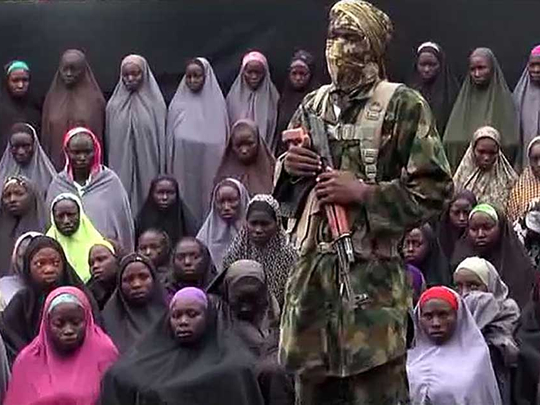
‘Are they the Chibok girls ?” Every time there is news of the women and girls held by Boko Haram, this is always one of the first questions; and the answer is usually ‘no’.
Then last Sunday, Boko Haram released a video apparently showing some of the girls and demanded the release of fighters in exchange for them. The abduction of 276 girls from a school in Chibok, in northeast Nigeria, in April 2014 captured national and international attention. The efforts of women activists in the city of Maiduguri and the Bring Back Our Girls campaign prompted global protests and offers of support from governments around the world. The Chibok girls joined corruption, “419” email scams and oil as what the outside world knows of Nigeria. The attention has all but died down even though, 855 days after the abduction, the majority of the girls are yet to come home. This video, which gave a sign that some were still alive and in Boko Haram’s clutches, has reignited national and international debate about what should be done.
Although the abduction from Chibok and the inability to secure the release of the girls have become symbolic of the conflict and the government response, it is representative of systemic issues rather than an exceptional case. That at least 2,000 women and girls were taken by Boko Haram between January 2014 and April 2015 is now well-known. Those who escape or are rescued find inadequate services for their needs and are often stigmatised and feared by families, friends and communities.
However, this focus on abductions alone risks missing the full picture. Women and girls in the northeast of Nigeria have been injured in and traumatised by attacks, which have left many with disabilities. Health care and counselling are unavailable or unaffordable. An impending famine is now likely due to devastated farmland and the diversion of humanitarian aid. With husbands and fathers often absent, women and girls struggle to provide for families. Few options for livelihood are available due to the impact of the violence, low levels of education and societal norms. This reality, and the impact of rising food prices, means many feel they have no choice but to sell sex to survive. Reports of sexual exploitation and abuse in internally-displaced people’s (IDP) camps — even by government officials and members of the military and civilian militias — have yet to be met with strong action.
When I was last in Maiduguri, women activists told me of seeing men go to camps to find ‘cheap brides’: Girls for whom they did not have to pay a high bride price. The impact of the conflict on other kinds of gender-based violence is unknown, but we know that domestic violence often rises after violent conflict.
In addition to looking at all forms of violence against women and girls, we need to recognise their agency: Women have negotiated humanitarian access with Boko Haram for medical care; and they are instrumental in providing for families and communities.
Before international agencies came to the northeast, it was women and men there who took care of IDPs. However, government response does not match these realities. As in other countries, women are left out of the decision-making process on what happens in the northeast: Committees of inquiry, government positions and peace negotiations.
Gendered assumptions are evident when talking about Boko Haram. Men are seen as choosing to join while it is assumed that women have been forced. This is not always true. There is a spectrum between the forced and voluntary for women and girls, as there is for men and boys. Although women and girls make up the majority of those taken, Boko Haram has abducted boys and men too. This latest video should prompt us to reflect on the holistic solutions needed, as well as what can be done to rescue these girls.
Strategies to prevent abductions, ensure comprehensive service provision and address stigma should be put in place. A more nuanced approach to how gender norms play out is needed to ensure the realities facing male and female combatants are reflected in programmes for disarmament, demobilisation, reintegration and rehabilitation. We need to prioritise women’s meaningful participation in peace-building and other areas of decision-making, and take action to rectify the marginalisation, frustration and unequal power relations felt by women and men.
The abductions from Chibok are only one part of the story. Without looking at the whole picture, we do not recognise that other women and girls are suffering too.
— Guardian News & Media Ltd
Chitra Nagarajan has worked to promote and protect the human rights of women in China, the United Kingdom, the United States and west Africa. She currently works to build peace in Nigeria.










